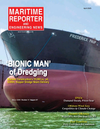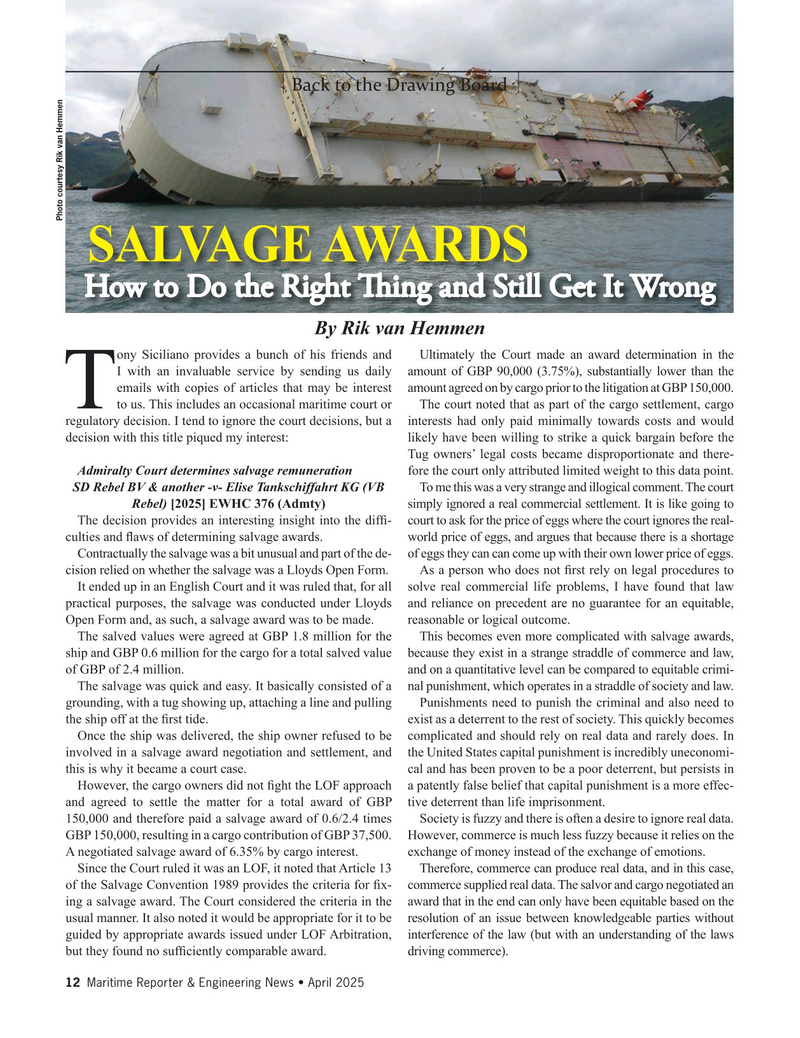
Page 12: of Maritime Reporter Magazine (April 2025)
Read this page in Pdf, Flash or Html5 edition of April 2025 Maritime Reporter Magazine
Back to the Drawing Board
Photo courtesy Rik van Hemmen
SALVAGE AWARDS l l hhT dl hhT dl How to Do the Right T ing and Still Get It Wrong
By Rik van Hemmen ony Siciliano provides a bunch of his friends and Ultimately the Court made an award determination in the
I with an invaluable service by sending us daily amount of GBP 90,000 (3.75%), substantially lower than the emails with copies of articles that may be interest amount agreed on by cargo prior to the litigation at GBP 150,000.
T to us. This includes an occasional maritime court or The court noted that as part of the cargo settlement, cargo regulatory decision. I tend to ignore the court decisions, but a interests had only paid minimally towards costs and would decision with this title piqued my interest: likely have been willing to strike a quick bargain before the Tug owners’ legal costs became disproportionate and there-
Admiralty Court determines salvage remuneration fore the court only attributed limited weight to this data point.
SD Rebel BV & another -v- Elise Tankschiffahrt KG (VB To me this was a very strange and illogical comment. The court
Rebel) [2025] EWHC 376 (Admty) simply ignored a real commercial settlement. It is like going to
The decision provides an interesting insight into the dif? - court to ask for the price of eggs where the court ignores the real- culties and ? aws of determining salvage awards. world price of eggs, and argues that because there is a shortage
Contractually the salvage was a bit unusual and part of the de- of eggs they can can come up with their own lower price of eggs. cision relied on whether the salvage was a Lloyds Open Form. As a person who does not ? rst rely on legal procedures to
It ended up in an English Court and it was ruled that, for all solve real commercial life problems, I have found that law practical purposes, the salvage was conducted under Lloyds and reliance on precedent are no guarantee for an equitable,
Open Form and, as such, a salvage award was to be made. reasonable or logical outcome.
The salved values were agreed at GBP 1.8 million for the This becomes even more complicated with salvage awards, ship and GBP 0.6 million for the cargo for a total salved value because they exist in a strange straddle of commerce and law, of GBP of 2.4 million. and on a quantitative level can be compared to equitable crimi-
The salvage was quick and easy. It basically consisted of a nal punishment, which operates in a straddle of society and law. grounding, with a tug showing up, attaching a line and pulling Punishments need to punish the criminal and also need to the ship off at the ? rst tide. exist as a deterrent to the rest of society. This quickly becomes
Once the ship was delivered, the ship owner refused to be complicated and should rely on real data and rarely does. In involved in a salvage award negotiation and settlement, and the United States capital punishment is incredibly uneconomi- this is why it became a court case. cal and has been proven to be a poor deterrent, but persists in
However, the cargo owners did not ? ght the LOF approach a patently false belief that capital punishment is a more effec- and agreed to settle the matter for a total award of GBP tive deterrent than life imprisonment.
150,000 and therefore paid a salvage award of 0.6/2.4 times Society is fuzzy and there is often a desire to ignore real data.
GBP 150,000, resulting in a cargo contribution of GBP 37,500. However, commerce is much less fuzzy because it relies on the
A negotiated salvage award of 6.35% by cargo interest. exchange of money instead of the exchange of emotions.
Since the Court ruled it was an LOF, it noted that Article 13 Therefore, commerce can produce real data, and in this case, of the Salvage Convention 1989 provides the criteria for ? x- commerce supplied real data. The salvor and cargo negotiated an ing a salvage award. The Court considered the criteria in the award that in the end can only have been equitable based on the usual manner. It also noted it would be appropriate for it to be resolution of an issue between knowledgeable parties without guided by appropriate awards issued under LOF Arbitration, interference of the law (but with an understanding of the laws but they found no suf? ciently comparable award. driving commerce). 12 Maritime Reporter & Engineering News • April 2025
MR #4 (1-17).indd 12 4/4/2025 1:51:08 PM

 11
11

 13
13
